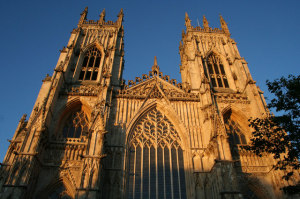Soul care requires hard work, sincere grief, and profound laughter.
Hard Work
York Minster Cathedral in York, England, is one of the world's architectural wonders. It's also one of the longest building projects, taking over 250 years to complete. The result is breathtaking.
The Cathedral is not only a beautiful and enduring work of art, it's a physical space where its builders can commune with each other and with God. And without burdening the point, sacred spaces like York Minster are meant to give the people inside an understanding of their very identity (i.e. Church is the place where Christians learn who they are). And this is why I describe soul care as hard work.
Placing one's self on the gurney of personal growth is physically, mentally, emotionally, and spiritually exhausting. It should be. We, too, are building a cathedral of sorts. We are designing and constructing, tearing down and rebuilding, learning and unlearning. We are lifting heavy things. We are exercising (literally) and eating in new ways. We are using all of our senses: listening more intently, looking for attentively, and touching more intentionally (I have on multiple occasions recommended massage therapy for clients who have not known human touch to be a safe experience).
Like a 9 to 5 job, soul care demands from us effort that may not come naturally. It asks us to turn around and swim upstream from our default strategies for living and relating. Perhaps this is why my clients at Journeys remark- and I've experienced this in my own therapy- that they sometimes leave sessions physically weary from “just talking.”
Soul care is hard work. The result? A beautiful, enduring work of art... a human masterpiece. In a sense, we become Cathedrals, places of worship where identity is formed, and communion is enjoyed with God and others. The difference between York Minster, and us, is that we don't have 250 years.
Sincere Grief
Grief is perhaps the primary example of the hard work that soul care requires. The tears that build York Minster take an enormous toll on our human resources.
Nevertheless, (effective) soul care always, always involves grief because grief and soul care are both interested in the same things: movement, change, and transformation.
G. Roualt
Sincere grief moves us from naivety to wisdom by helping us approach death, inherent in every life, with an appropriate (truthful) response. In other words, we grieve in soul care because there is death in the world and to do otherwise would make us dishonest, or, at the least, completely out of touch with reality.
Author and Psychologist Thomas Moore, one of my favorite writers, in his wonderful book “Care of The Soul,” calls grief a gift of soul care, saying that, to resist sadness in everyday life is to set up one's self for a major, debilitating meeting with depression later on. More than this, to resist grief is to resist its unique vision of the world, full of darker colors, that ironically moves us away from cynicism towards age and wisdom.
Another author, and an Anglican priest, Mike Mason, also makes this connection between sadness and transformation of the soul. “Sadness signals change,” he writes.
...It is an intermediate emotion, a feeling that is going somewhere. Like a seventh or a ninth chord in music, it is rich in subtle tones that tend toward resolution, lean toward home. This is what distinguishes sadness from moroseness, self-pity, or depression, all of which have a feeling of stuckness. Sadness is always in motion in the backfield. You will know the real thing by this sense of movement toward happiness. In photographs, crying and laughing are hard to tell apart.
Sadness is like that moment in a rainstorm when the rain has not yet stopped, but there is a perceptible brightening, and there comes that subtle change in the atmosphere signifying the imminence of a rainbow. Sadness is hopeful. Anger feels hard in the body, fear feels alien, and depression is like a dull poison. But sadness is at home in flesh and blood. It is a soft and relaxed presence, a comfortable garment for the heart. - Mike Mason, Practicing the Presence of People
Soul care invites us to reconsider the role of sadness and other so called “negative” emotions in our lives. Instead of seeing them as problems, we can see them, perhaps with the help of a therapist, as sign posts of healing and growth.
Soul care is hard work. It is sincere grief. And it is also, thank God, laughter. Soul care is profound laughter.
Profound Laughter
My wife, Mindy, loves to watch YouTube videos. There's one video she could watch a hundred times in a row without getting bored. And she's not alone because this video is one of the most watched in YouTube's history. Any guesses? See for yourself:
https://www.youtube.com/watch?v=HttF5HVYtlQ
Author Frederich Buechner has written a lot about the significance of laughter in his own life and in the human experience. He even attributes his conversion to Christianity to hearing the great preacher, George Buttrick, speak of salvation as great laughter:
And then there came one particular sermon with one particular phrase in it that does not even appear in a transcript of his words that somebody sent me more than twenty-five years later so I can only assume that he must have dreamed it up at the last minute and ad-libbed it—and on just such foolish, tenuous, holy threads as that, I suppose, hang the destinies of us all. Jesus Christ refused the crown that Satan offered him in the wilderness, Buttrick said, but he is king nonetheless because again and again he is crowned in the heart of the people who believe in him. And that inward coronation takes place, Buttrick said, "among confession, and tears, and great laughter." It was the phrase great laughter that did it, did whatever it was that I believe must have been hiddenly in the doing all the years of my journey up till then. It was not so much that a door opened as that I suddenly found that a door had been open all along which I had only just then stumbled upon. - Frederick Buecher, The Sacred Journey
That conversion involves great laughter points to its necessity in soul care which is, in a sense, daily conversion. And that soul care requires laughter should not surprise us even though it does. For instance, if you stopped by Journeys Counseling Center in Orlando, where Mindy and I have an office, you probably wouldn't believe the amount of laughter sneaking out from the otherwise soundproof counseling rooms. I don't mean to imply that soul care is amusement. It's much deeper. It's the laughter that Frodo Baggins and Samwise Gamgee share at the end of their journey in J.R.R. Tolkien's "Lord of The Rings" trilogy.
Soul care looks like this: my dad walking in from a rare snow in Tennessee. I love this picture of my dad. I keep it in my phone and look at it occasionally. He is a fairly quiet man but the emotion on his face here- the laughter- is worth a million words. I can only imagine what crazy joke my mom has told him to provoke such a free smile. Look at his face. Can you hear the sound of a quiet man turned into a laughing child because of frozen water flying through the air? This is what soul care both requires and produces.
As Mike Mason already mentioned, laughter is interesting in that it’s hard to tell the difference between the face of someone laughing and that of someone crying. In fact, laughter is at its best when it includes tears! The English novelist William Makepeace Thackeray said: "humor is the mistress of tears." This is why laughter is more profound than amusement. And why the fly on the wall of the counseling room never knows whether the client and the therapist are laughing or crying. We're doing both at the same time.
One final word on laughter and soul care: I think of them both in the context of redemption. For Christians, redemption is given metaphorical form in the wildly colorful vision of heaven found in the Revelation of Saint John. Heaven, John says, is a place where there will be no more darkness, crying, or pain. In their place is the presence of the Trinitarian God. And when I think of this place I wonder what our faces will look like- in the light of God. I picture us laughing. I picture our faces like that of my dad's.
-Josh Bales






